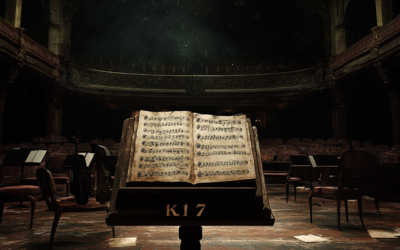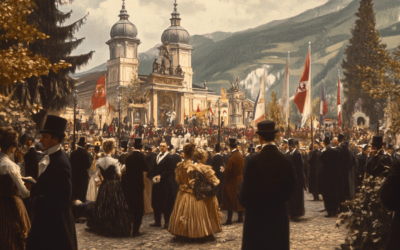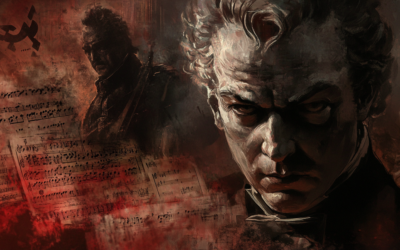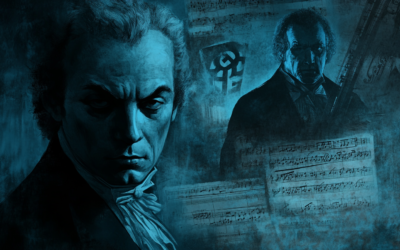The Golden Spur
A Farce of Honour in Mozart's Time
How a once prestigious title became a symbol of ridicule for Mozart and Casanova
Mozart: The Fall of the Gods
This book offers a fresh and critical look at the life of Wolfgang Amadeus Mozart, challenging the myths that have surrounded him for centuries. We strip away the romanticised image of the “natural genius” and delve into the contradictions within Mozart’s extensive biographies. Backed by nearly 2,000 meticulously sourced citations, this work invites readers to explore a deeper, more complex understanding of Mozart. Perfect for those who wish to question the traditional narrative, this biography is a must-read for serious music lovers and historians.
"It was said that anyone who wore the Speron d’Oro was considered an ass."
Mozart: The Fall of the Gods
On Saturday, 19 May 1770, Leopold wrote from Naples to his wife about the Miserere, mentioning a newspaper article that was never found again. In his letter, he reassured His Grace, the Prince of Salzburg, that Wolfgang would soon receive a great honour.
Leopold and Wolfgang arrived in Rome on Tuesday, 26 June, and that very day, Cardinal Andrea Negroni, responsible for the Vatican Secretariat of Briefs, was tasked with registering the conferment of the Speron d’Oro to Wolfgang, enrolling him in the Order of the Militia Aurata.
However, it was not the Pope who personally granted him the title, as some accounts would later falsely claim, but rather Cardinal Pallavicini, possibly due to Leopold’s insistence or pressure from the Pallavicini family of Bologna, who had close ties with Austria.
The awarding of the Speron d’Oro to Mozart was not the result of any extraordinary musical achievement, such as the apocryphal story of the transcription of Allegri’s Miserere. It was a simple matter of networking and pressure applied on the Vatican. This honour, which Leopold proclaimed proudly as a great fortune, was by then more of a farce than a genuine mark of distinction. By Mozart’s time, the Speron d’Oro had lost all its former value. It had become a mere trinket, almost laughable, and often mocked. The title was no longer an indication of merit, but rather something that could be obtained through money or influence.
The same Speron d’Oro was given to none other than the notorious Casanova.
“Reverend Father,” Casanova wrote in his Memoirs, ‘at the home of Abbot Momolo, most holy fucker, I saw a young woman named Maria, of whom you are the confessor. I have fallen in love with her, and in an attempt to seduce her, I want to offer her money. Here is the sum for the good girl, Reverend Father.’ I was sitting at the table with Mengs when a messenger from the Holy Father arrived. He asked Mr Mengs if I lived there, and after the gentleman pointed me out, he handed me, on behalf of the Holy Father, the cross of the Order of the Golden Spur, along with the diploma and the patent bearing the papal seal.”
Casanova, like Mozart, initially felt proud of the honour. In fact, Casanova explains in his Memoirs that the medal was no longer a symbol of genuine merit but more an object of ridicule. He recalls being advised in Russia to remove the medal from his neck to avoid being laughed at. Similarly, Leopold had pressured his son to wear the cross and sign his compositions as “Knight W. A. Mozart.” However, Wolfgang, much like Casanova, soon came to realise that the title had lost its lustre. He was ridiculed and mocked, as he himself wrote in a letter. Over time, he discarded the title entirely, considering it more a burden than a badge of distinction.
Receiving the Speron d’Oro was not a reflection of Mozart’s genius. It was no longer an honour that musicians aspired to, unlike Gluck, who had received it at a time when it still held some value. By Mozart’s time, the award had become so devalued that many, like Casanova, believed it was better not to receive it at all. In fact, it was said that anyone who wore it was considered an ass.
As time passed, Mozart distanced himself from the Speron d’Oro, recognising, like Casanova, that it was nothing more than an empty gesture. The title, which could easily be purchased, became so devalued that by 1841, Pope Gregory XVI reformed the Order entirely, replacing it with the Order of St Sylvester.
You May Also Like
Constanze Mozart’s Enduring Love
Although some have doubted her devotion, Constanze’s own words and actions illustrate a widow deeply committed to preserving Mozart’s legacy. Diaries, personal correspondence, and eyewitness testimony all challenge the notion that she neglected his memory—while the circumstances around his burial grow ever more perplexing.
A Revealing New Interview on His Thematic Catalogue
We’re excited to present a brand-new interview that challenges many of the long-held assumptions about Mozart’s Thematic Catalogue (1784–1791). Conducted by Swedish journalist Henry Grynnsten, this conversation delves into groundbreaking forensic techniques—like advanced ink analysis and digital image processing—that may change the way we view Mozart’s late works.
The Rattling Symphony: A Critical Take on K. 17
Often attributed to Mozart, the K. 17 symphony is anything but refined. Lacking orchestration and filled with gaps, it raises more questions than answers about its true authorship.
The Hidden Origins of the Salzburg Festival: A Nationalist Dream
The Salzburg Festival, far from being a mere celebration of Mozart’s genius, was born out of nationalist ambitions during a turbulent period in Austro-German history. Conceived by figures like Max Reinhardt, Heinrich Damisch, and Friedrich Gehmacher, the festival was deeply rooted in ultranationalistic ideals, transforming Mozart’s legacy into a tool for cultural dominance. The truth behind its founding has long been obscured, but the primary sources tell a different, darker story.
Mozart, Wagner, and the Nazi Myth
The Führer’s admiration for Wagner’s racially charged ideology not only influenced the policies of the Nazi regime but also reshaped the legacy of Mozart. Under National Socialism, Mozart was not celebrated as a universal genius but as a symbol of German purity and superiority. His music, stripped of its international influence, was rebranded as an expression of Aryan identity, intended to unify and inspire the German people.
Mozart, the Anschluss, and Nazi Propaganda
Following the 1938 Anschluss, the Nazi regime rebranded Mozart as the quintessential German composer, using his image to promote unity between Austria and Germany. The Salzburg Festival became a platform for Nazi propaganda, distorting Mozart’s legacy to fit their nationalistic and racial agenda.







